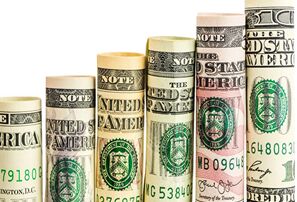投资理财入门大坑:利率与通货膨胀
|
Pay Attention to Taxes and Inflation To paraphrase famed investor Warren Buffett, when it comes to measuring your investment results over time, the primary thing that matters is how many more hamburgers you can buy at the end of the day. In other words, focus on purchasing power. It is amazing how few professional portfolio managers focus on pre-tax returns rather than after-tax returns or who ignore the rate of inflation.
Many trade frequently and although they may earn 9% to 12% for their investors over long periods of time, if those investors are in a high marginal tax bracket, the investors will end up with less wealth than they would have otherwise had if they had hired a more conservative manager who made 10% but who structured the investments with an eye towards April 15th. Why? In addition to the enormous cost savings that result from long-term investing (as opposed to short-term trading), there are several tax advantages. Here are some of them: Short-term capital gains are taxed at personal income tax rates. In New York City, for example, Federal, State, and Local taxes on these types of short-term gains can meet or exceed 50%! At the Federal level, the worst damage is presently 39.6%. In contrast, long-term capital gains, or those generated from investments held for one year or longer, are typically taxed between 0% and 23.6% at the Federal level. Unrealized gains are a sort of "float" on which you can continue to experience the benefit of compounding your money. If you sell your investment to the move the money into a new stock, bond, mutual fund, or other investment, you are not only going to have to pay commissions, but you are going to have to give the tax man his cut of your profits. That means the amount you have available to reinvest is going to be substantially lower than the amount shown on your balance sheet just before you liquidated the position. That's why the best investment minds, such as Benjamin Graham, said you should only consider switching out of one investment and into another if you think the new position is far more attractive than your current one. In other words, it's not enough for it to be a "little" more attractive - it needs to be absolutely evident to you. To learn more about this topic, read Using Deferred Taxes to Increase Your Investment Returns. Where and how you hold your investments can exert a significant influence on your ultimate compounding rate. If you own shares of many different companies, some of these stocks are likely to pay large cash dividends, while others retain most profits to fund future expansion. (To learn why this happens, read Determining Dividend Payout: When Should a Company Pay Dividends?). Certain types of bonds, such as tax-free municipal bonds, can be exempt from taxes even when held in taxable accounts under the right conditions, while other types of interest income, such as those generated by corporate bonds held in an ordinary brokerage account, can be taxed at almost 50% by the time you add up Federal, state, and local taxation. As a result, you need to pay careful attention to where, precisely, on your balance sheet specific assets are placed if you want to get the most from your money. For example, you would never hold tax-free municipal bonds through a Roth IRA. You would prioritize putting the dividend paying stocks in a tax shelter such as a Roth IRA and non-dividend stocks in an ordinary brokerage account. Always, always, always contribute to your 401k at least up to the amount of your employer match. If your employer matches $1 for $1 on the first 3%, for example, you are instantly earning a 100% return on your money without taking any risk! Even if you grab the matching money and park your 401(k) balance in something like a stable value fund, it's free cash. Don't overlook the benefit of seemingly boring assets such as Series I savings bonds, which have some significant inflation advantages. |









